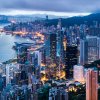- Date
- 7 April 2021
Chinese Whispers: Changes in Hong Kong Raise Concerns
Chinese Whispers: Changes in Hong Kong Raise Concerns
By Alison Catchpole |
The Story
“Today China enacted changes to Hong Kong’s electoral system which are a clear breach of the Joint Declaration – undermining the freedoms of the people of Hong Kong and breaking Beijing’s international obligations,” tweeted UK Foreign Secretary Dominic Raab on 30 March 2021. The law that was passed subjects all Hong Kong electoral candidates to a strict vetting process and dilutes the proportion of democratically elected lawmakers. Decisions made by the committee will be final and impossible to appeal.
The 1984 Sino-British Joint Declaration outlined basic policies that China agreed to uphold after the ‘handover’ of the former British colony on 1 July 1997. The ‘one country two systems’ formula was supposed to guarantee five decades of autonomy under Hong Kong’s mini-constitution, the Basic Law. However, by 2017, Chinese Foreign Ministry spokesman Lu Kang was already asserting that “as a historical document, [the Declaration] no longer has any practical significance, and it is not at all binding for the central government’s management over Hong Kong. The UK has no sovereignty, no power to rule and no power to supervise Hong Kong after the handover” (Reuters).
China maintains a civil law system, whereas Hong Kong inherited the English common law system developed under British colonial rule. Protests against a controversial bill that would have allowed extradition to China have been ongoing since June 2019, often violent and disruptive. In June 2020, Beijing hit back with a ‘National Security Law’, brought in over the heads of the territory’s legislators. Crackdowns on teachers, the media, and non-government organisations have ensued, with more than 90 people so far detained under the law (The Guardian).
Under further suggested changes, judges would be forced to consult a pro-Beijing council before handing down sentences (Financial Times). Judicial independence, the separation of the law from other branches of government, provides a natural part of the ‘checks and balances’ against abuse of power and ensuring impartiality. Hong Kong’s Basic Law allows a Court of Final Appeal staffed in a rotation system, including 14 overseas judges. UK Supreme Court president Robert Reed told Parliament in mid-March he would consider quitting Hong Kong’s Court of Final Appeal “if there’s any undermining of the independence of the Hong Kong judiciary or if it’s expected to act contrary to rule of law, or… where we could no longer in good conscience serve there” (SCMP).
What It Means For Businesses And Law Firms
Key opponents of Beijing such as the ‘Apple Daily’ tabloid proprietor Jimmy Lai and veteran politician (and barrister) Martin Lee, are amongst seven of the city’s most prominent moderate pro-democracy activists to face jail after their conviction on 1 April 2021 for unlawful assembly (BBC). In January, British barrister David Perry QC had agreed to run the Hong Kong government’s prosecution, later pulling out after pressure from the UK government. Lai still faces charges under the National Security Law, facing life in prison if convicted.
Hong Kong’s equity markets have been booming, with Chinese companies rushing to list (The Lawyer). However, a new rule introduced last week would reduce the level of transparency required, allowing company directors to obscure their identities (Financial Times). Hong Kong CEO Carrie Lam said the proposal would prevent “doxing” – the act of publicly revealing previously private personal information about an individual or organization – but corporate governance experts and accountants have criticised the proposals as facilitating fraud. With directors able to remain anonymous, due diligence investigations could be hindered, and accountability to shareholders and creditors eroded.
The Biden administration has indicated that Hong Kong will not receive preferential treatment under US law after the Beijing crackdowns. US law firms Locke Lord, Vinson & Elkins and Orrick, Herrington & Sutcliffe shuttered their Hong Kong offices in 2020, as did UK firm Osborne Clarke. Arguing in The Times recently, former Supreme Court judge Lord Jonathan Sumption insisted, “Democracy has never existed in Hong Kong, but the rule of law has and still does.” The hope is that the Pearl of the Orient will continue to enjoy its special status but with the UK Home Office expecting 150,000 Hong Kongers to move to the UK this year (Financial Times), some of the lustre may be fading.
